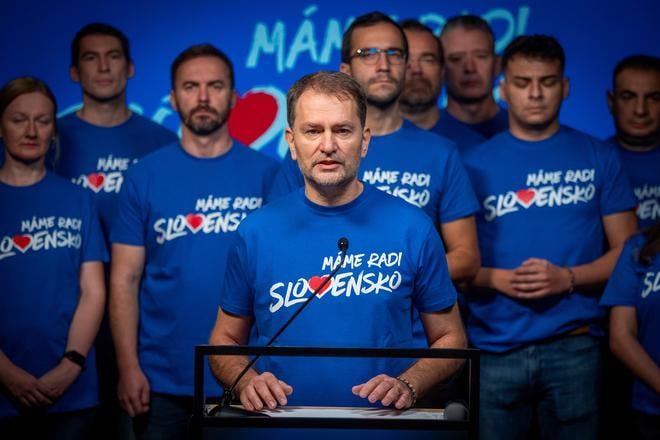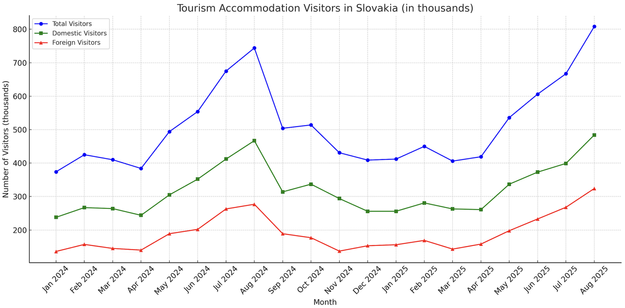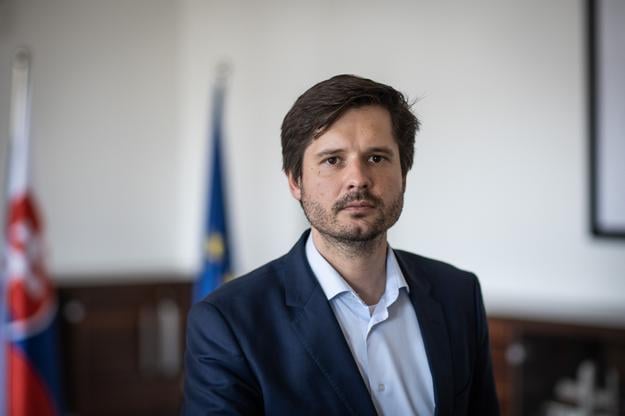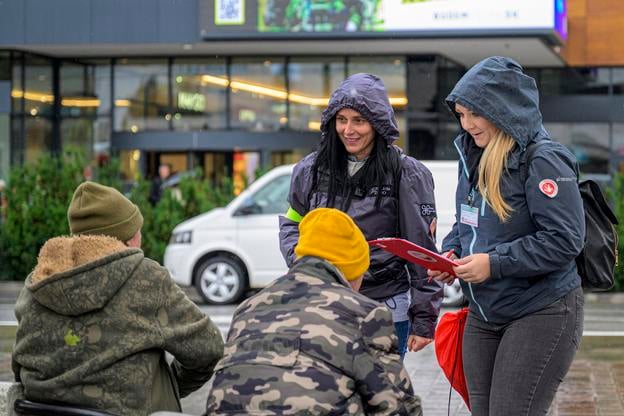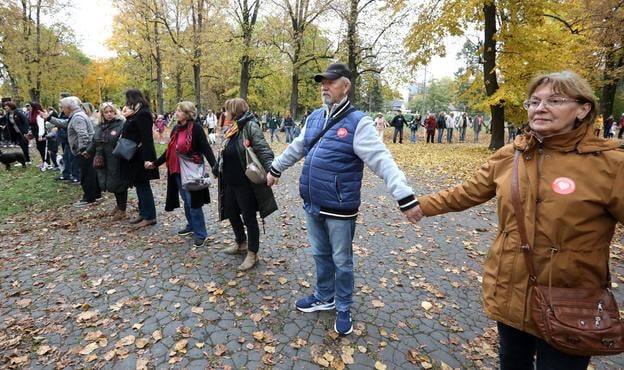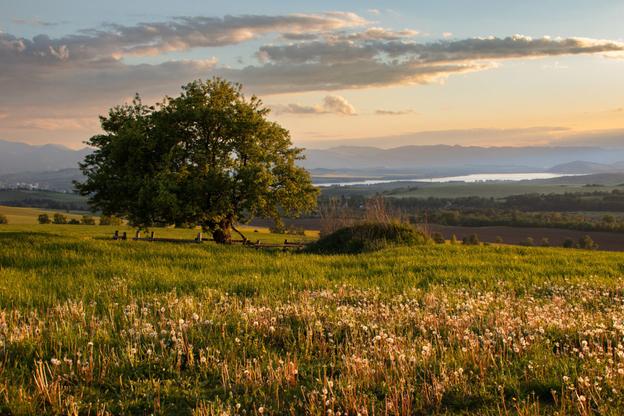Hey, Slovakia watchers — here’s Today in Slovakia: where Igor Matovič talks coups, Robert Fico gets the kind of news no one’s shocked by, and Slovakia crowns its Tree of the Year.
Mafia’s diabolical plan: The Hnutie Slovensko leader has unveiled “Prevrat 2027”, a self-styled people’s uprising to thwart what he calls the “mafia’s diabolical plan” to win the next election. Matovič claims Robert Fico’s Smer, Hlas, and SNS aim to cling to power — Plan A through a joint ticket, Plan B by sending Hlas into coalition with Progressive Slovakia.
His counter: a monthly public vote on policy proposals via prevrat2027.sk, shaping his movement’s conditions for any post-2027 coalition. Matovič says the goal is to let “people, not politicians, dictate the terms”.
First three questions: Cut politicians’ pay by 50 percent until Slovakia stops running deficits. Raise child benefits from €60 to €100 a month. Ban private health insurers from taking profit if a patient waits more than 30 days for surgery.
Sounds familiar? Matovič used a similar online poll in 2020 before winning the election — few of those pledges ever materialised.
Matovič vs Šimečka: Matovič insists that without his movement no opposition government can be formed — and that PS leader Michal Šimečka will “have to take us in” if he wants to govern after 2027. The two are on frosty terms: Šimečka pointedly avoids engaging with Matovič, while Matovič accuses him of cowardice for refusing to state clearly that Progressive Slovakia would never join forces with Hlas — or Smer 2, as some call it.
Bottom line: Matovič is turning anti-elite anger into a digital plebiscite.
And now, on a brighter note.
Room service, please
Slovakia’s accommodation industry smashed records this summer, welcoming more than 800,000 guests in August — the highest monthly tally ever, according to the Statistics Office.
BY THE NUMBERS: Hotels, guesthouses and other lodgings hosted 808,000 visitors — up nearly 9 percent year-on-year and about 16,000 above pre-pandemic highs. Guests clocked 2.2 million overnight stays, a 6.6 percent boost from 2024, averaging 2.8 nights per stay.
FOREIGNERS FUEL THE SURGE: The rebound came largely from abroad — 324,000 foreign visitors, up 17 percent from last year and just shy (0.5 percent) of the all-time 2019 peak.
STILL STAYING LOCAL: Domestic travellers made up roughly two-thirds of all guests (484,000), up nearly 4 percent year-on-year. Slovaks remain the backbone of the tourism market — even if the pandemic-era staycation boom has eased.
REGIONS ON THE RISE: Every Slovak region posted growth, led by Žilina (+12.3 percent), followed by Bratislava and Prešov, each topping 150,000 visitors. Together, those three regions accounted for almost two-thirds of all stays.
ZOOM OUT: From January to August, Slovakia counted 4.3 million visitors, a 6 percent jump from last year, with foreign tourism doing the heavy lifting. Overnight stays climbed 5 percent, nearly matching the country’s 2019 pre-COVID record.
BOTTOM LINE: With foreigners flocking back and locals still filling rooms, Slovakia’s hospitality sector is not just recovering — it’s breaking records and officially back in business.
What The Slovak Spectator had on Friday:
PM Fico’s party expelled from Europe’s socialists after long rift
Fico and Svyrydenko toast to ‘just peace’ in Ukraine during Slovak–Ukrainian talks
Russia’s Bratchikov leaves, another Kremlin propagandist arrives
Slovak man jailed for pushing German tourist off Brno castle wall files complaint
Slovakia’s UNESCO village opens a new window into rural life
Kofola craze bubbles up in Asia thanks to determined content creators
The half-million-euro offer
Slovakia’s new anti-mafia office (ÚBOK) has uncovered one of its biggest corruption cases yet — charging a businessman who allegedly offered both a hefty bribe and a system for laundering the money, according to Aktuality.sk.
THE BACKSTORY: The case dates back to 2021, during Eduard Heger’s government, and involves the Environment Ministry. Then–deputy minister Michal Kiča told police he had been approached with a bribe worth more than half a million euros, reportedly tied to a multi-million-euro public tender.
The accused allegedly even had a full “scheme” worked out — a step-by-step plan to legalise the funds. Kiča (Demokrati) reported the offer immediately to his then–minister Ján Budaj and cooperated fully with investigators.
FOUR YEARS LATER: The accused, reportedly businessman Miloš Á., was formally charged just last month with indirect corruption and money laundering in the preparation stage. Police confirmed the charges but declined to name the individual.
Party leader Jaroslav Naď, who now heads the Demokrati party, praised investigators, saying the case shows persistence pays off — even after the dissolution of Slovakia’s anti-corruption unit NAKA.
THE PROJECT AT THE CENTRE: The alleged bribe concerned a €40 million tender for the clean-up of toxic sludge ponds in the village of Predajná — a legacy of the Petrochema Dubová refinery, where acidic waste has been leaking since the 1960s.
The ministry, under Budaj, eventually cancelled the tender in June 2021, citing discriminatory criteria and potential manipulation. Internal audits had flagged suspicious procurement patterns — inflated technical requirements and experience conditions that could have narrowed competition.
If you like what we are doing and want to support good journalism, buy our online subscription with no ads and a print copy of The Slovak Spectator sent to your home in Slovakia. Thank you.
Counting the invisible
A year on from its first full count of people without a home, Košice — Slovakia’s second-largest city — has revealed the results. The numbers are sobering.
Between 7 and 11 October 2024, the city identified 2,300 people experiencing homelessness, including nearly 1,000 children living with parents in temporary or substandard housing. The census was part of a European project across 15 cities — from Milan to Dublin — to map homelessness on the continent.
This year, Prešov — Košice’s neighbour up the road — joined the project.
The findings: Most of Košice’s homeless population live in makeshift housing — shacks, sheds and garden cabins. Only about 150 people sleep directly on the streets, far fewer than City Hall expected. “Homelessness in Košice takes many forms,” the municipality said, pointing to concentrations in the Old Town, Luník IX and Košice-Juh.
The causes: Researchers found that family breakdown and financial hardship were the leading triggers of housing loss. Nearly two-thirds of respondents have faced housing insecurity for more than five years, and over a quarter have never had stable housing at all.
The politics: Mayor Jaroslav Polaček says the city is rebuilding its social housing stock. Since 2019, Košice has provided 120 low-cost municipal flats, compared with just two in the previous two years. The city now owns 1,600 flats and is working with the state and private developers on a €1.3 billion plan to build 5,400 rental units.
Deputy Mayor Lucia Gurbáľová said homelessness is about more than housing. “Behind every statistic is a story — of job loss, illness or family breakdown,” she said. “It’s also about dignity and solidarity.” She pointed to the city’s new municipal hospice, calling it part of a wider effort to offer “dignity in life and dignity in dying”.
Why it matters: Košice sits mid-table among Europe’s 15 cities in the project — but with one red flag: a high share of people without access to 24-hour shelter.
For a city long defined by steel and innovation, Košice’s next challenge may be something simpler — a safe place to sleep.
And the rest…
A disciplinary case has been opened against Bratislava judge Michal Kubiš, nearly two years after he ruled to reinstate police vice-president Branko Kišš — a decision that Interior Minister Matúš Šutaj Eštok (Hlas) fiercely criticised and once threatened to punish. The proceedings were launched by Justice Minister Boris Susko (Smer), who claims Kubiš committed a serious disciplinary offence by failing to declare potential bias. (Denník N)
Slovakia’s cultural scene is bracing for another round of cuts. Culture Ministry official Lukáš Machala has ordered theatres, museums and orchestras to slash 10 percent of staff, a move directors call “the final squeeze” that could cripple the country’s already underfunded arts institutions. (SME)
A new cross-border analysis by the Ján Kuciak Investigative Centre has found that Slovak politicians are paying to spread attacks on journalists, with the ruling Smer party responsible for the majority of them. Out of 773 paid political attack ads identified across Visegrad countries, 523 came from Slovakia, with 65 percent funded by Smer. The main targets were media outlets Denník N, SME and Aktuality.sk, while journalist Marek Vagovič was the most frequently singled out. The study also notes that Meta profited tens of thousands of euros from hosting the ads. (ICJK)
Finance Minister Ladislav Kamenický questioned rising defence spending in Europe, citing Poland’s and Germany’s budgets and asking rhetorically, “Who’s preparing for war?” Speaking on Joj 24’s Politika 24, he reiterated his opposition to increasing Slovakia’s own military spending, noting the country currently allocates 2 percent of GDP to defence. Kamenický compared that to Poland’s 4 percent and Germany’s 1.9 percent, but made no mention of Russia’s more than 7 percent, despite its ongoing war against Ukraine.
The Sitina Tunnel in Bratislava will be closed in both directions for scheduled maintenance on two consecutive nights — from Friday, 17 October at 22:00 to Saturday, 18 October at 10:00, and again from Saturday, 18 October at 22:00 to Sunday, 19 October at 10:00. Drivers are advised to use alternative city routes during the closures.
General Prosecutor Maroš Žilinka has announced he will review the government’s decision to cancel the 15 September public holiday in 2026, marking the Feast of Our Lady of Sorrows, a major Catholic holiday. Žilinka said he would assess whether the move — part of the government’s budget consolidation plan, is consistent with the Slovak Constitution and the Vatican Treaty.
Friday scroll: Selected Facebook posts from the parliamentary parties
COALITION
Smer: After the Party of European Socialists expelled Smer, several party figures pushed back. Meanwhile, MEP Ľuboš Blaha attacked Bratislava mayor Matúš Vallo, calling him a “fascist” and vowing a criminal complaint over the removal of the communist Marek Čulen monument.
SNS: SNS leader Andrej Danko slammed the Party of European Socialists after it expelled Smer, accusing “Brussels socialists” of throwing Slovaks out of cooperation for rejecting their “green experiments on people” and calling them cowards. He also took aim at Progressive Slovakia MPs, claiming they don’t show up to work.
Hlas: The party took a lighter approach — sharing a photo dump with Ukrainian officials and EU Commissioner Maroš Šefčovič, while party leader Matúš Šutaj Eštok highlighted his recent media appearances in a series of posts.
OPPOSITION
Slovensko: #prevrat
PS: Progressive Slovakia reacted sharply to the PES decision to expel Smer, with leader Michal Šimečka calling the prime minister “Putin’s useful idiot”. The party also shared an infographic on poverty, warning that it now threatens nearly a million Slovaks (18.3 percent), blaming the rise on 14 years of Smer-led “social” governments.
SaS: SaS, together with other opposition parties (except Matovič’s Slovensko), announced plans to call an extraordinary parliamentary session over what they describe as Pavol Gašpar’s inability to lead the Slovak Information Service.
KDH: The Christian Democrats focused on education reforms, criticising the coalition for starting the debate late Thursday around 22:00. The party also shared a satirical image of the education minister, styled after a famous painting, captioned “Zľakol sa?” (“Did he get scared?”).
WOMEN TAKE THE SCREEN. A new showcase of Czech and Slovak cinema celebrating women in film opens Friday at Capitólio Filmoteca in Porto Alegre, running through 2 November. The programme features Slovak animator Jaroslava Havettová, with eight shorts from the 1960s–1980s, alongside works by other female Slovak directors. Also on tap: feature films spotlighting strong female leads and post-screening discussions. The festival follows last year’s hit “Forbidden Czechoslovak World” series in Porto Alegre and São Paulo.
PIGEON TRAPS ON THE ROOFTOPS. Ružomberok has launched a citywide pigeon capture using wire cages placed on rooftops along Liptovská Street. The winter effort, baited with corn, runs through year’s end to reduce overpopulation. Experts inspect the birds, culling sick ones to help control the city’s flock.
LOVE ENDURES. Vlasta and Ján Gerhard of Dubnica nad Váhom just marked their 56th wedding anniversary, celebrated with a touching photo in traditional folk dress that went viral.
SLOVAK TREE OF THE YEAR. A 150-year-old wild apple tree from Žiar in the Liptovský Mikuláš district has claimed the Tree of the Year title, earning 4,345 votes in the Ekopolis Foundation poll and outpacing rivals from across Slovakia. Next up: the European Tree of the Year contest this spring.
WEEKEND TALK SHOWS — WHO’S ON AIR
Saturday, 18 October: STVR – Sobotné dialógy (12:10)
• Roman Michelko, Slovak National Party MP
• Gábor Grendel, Slovensko MP
Sunday, 19 October:
JOJ 24 – Politika 24 (10:00)
• Pavol Gašpar, head of the Slovak Information Service (SIS)
TA3 – V politike (11:00)
• Erik Tomáš, labour minister (Hlas)
• Martina Bajo Holečková, SaS MP
STVR – O 5 minút 12 (11:55)
• Tibor Gašpar, Smer MP
• Alojz Hlina, SaS MP
Markíza – Na telo (13:00)
• Tomáš Drucker, education minister (Hlas)
• Ján Horecký, KDH MP
WEEKEND WEATHER IN SLOVAKIA:
Saturday: Cloudy with showers, clearing later; snow in higher areas. Highs 10–15°C, north 5–10°C.
Sunday: Mostly sunny, local fog and light snow in the north. Highs 9–14°C.
Monday: Clear with some fog or low cloud, more clouds in the west later. Highs 10–15°C.
NAME DAYS: Lukáš (Saturday, 18 October), Kristián (Sunday, 19 October) and Vendelín (Monday, 20 October).
SLOVAKIA’S WEEK AHEAD
MONDAY — German Days open in Banská Bystrica; AI Day 2025 in Prešov explores tech in education. In Bratislava, press briefings range from civil society (Building Bridges) to the police chief hearing in parliament. The evening wraps with the Anasoft Litera 2025 literary awards.
TUESDAY — Parliament resumes its session. Highlights include the H2SK Forum on hydrogen. In Bratislava, SaS leads a march against SIS chief, and the Jeden svet human rights film festival opens.
WEDNESDAY — Equal Pay Day survey unveiled in Bratislava. The government meets, and Comenius University holds its Law Day 2025.
THURSDAY — Slovak Global Network Summit debates the country’s vision; Game Days 2025 launch in Košice. Bratislava hosts Influential and Inspiring Women talks at the French Institute.
FRIDAY–SUNDAY — Culture takes center stage: Bratislava Jazz Days, Climathon Bratislava, and Nočná obloha nad Devínom stargazing. Saturday brings TEDxTrenčín, Štúr anniversary events, Open Cellars in Limbach, and Lampion floating at Bratislava’s Zlaté piesky. The week closes Sunday with the Pink Nordic Walking March in Zvolen.
Thanks for reading — and for making us part of your routine. Have a great weekend; we’ll be back Monday.
P.S. If you have suggestions on how our news overview can be improved, you can reach us at editorial@spectator.sk.
Follow The Slovak Spectator on Facebook, LinkedIn and Instagram(@slovakspectator).
Join our newsletter family and never miss a Slovak moment: Today in Slovakia | Last Week in Slovakia | Slovak Science| Spectacular Slovakia | Slovak Roots


